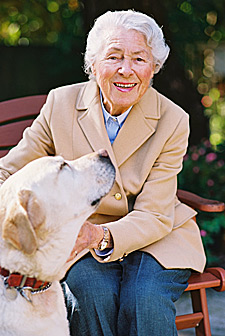 Anglicare is to build new low-care aged facilities as the foundation of a long-term strategy to solve the funding problems facing its eight Chesalon nursing homes in Sydney and the South Coast.
Anglicare is to build new low-care aged facilities as the foundation of a long-term strategy to solve the funding problems facing its eight Chesalon nursing homes in Sydney and the South Coast.
Following a year long review of its Aged Care division " which provides care worth over $28 million per annum " Anglicare Council decided to adopt a radically different residential aged care model.
The new model will see the provision of both high-care and low-care services at several sites, the construction of new homes in areas of the Diocese where Chesalon is not presently ministering, as well as the expansion of the work caring for frail aged people who live in the community.
Under the plan, the number of beds Anglicare provides is expected to increase by 35 per cent to approximately 610.
These changes are also expected to address many of the deficit issues currently facing Anglicare.
The Government-commissioned Hogan Report make it clear that the politics of the aged care issue mean that stand alone high care facilities such as Chesalon will be unviable into the future.
Mr Kell says this finding, "contributed to our decision to expand into low care'.
While there is no additional financial support from Government for low care, Mr Kell explains that legislation allows for a different method of resident payments, including the charging of an accommodation bond.
"From this Accommodation Bond an amount determined by Government is deducted weekly for a maximum of 5 years. On separation the remainder of the Accommodation Bond is paid to the resident or the estate. Interest gained on the bond during the residents entire length of stay remains with the facility," he says.
"Support from Government will also include approval to build in areas deemed to have a need for such a facility."
While Anglican Retirement Villages (ARV) already has low-care facilities, Mr Kell says what Anglicare will provide is different.
"The first thing I would say that there is nothing wrong or inconsistent with having more than one provider of a service or ministry in the Diocese. Moore College and Youthworks both provide theological education; SASC and the other Diocesan Schools provide a variety of child education," he says.
"We will not be providing any independent living facilities, an enormous part of ARV's work. Our core focus will continue to be on the elderly with care needs, whether high care, low care or dementia.
“The range of care needs we will be providing in our new facilities will be very similar to the range that existed in our nursing homes when Chesalon commenced its residential work decades ago."
In 2003, Chesalon celebrated 60 years of providing care to the elderly in our community. Anglicare will remain committed to Chesalon's specific aim of supporting the poor and vulnerable frail aged.
"[The Anglicare] Council was very aware of this issue when reaching its decision and has made special provision for a continuing policy to provide for and protect those people who come to us on a concessional basis," Mr Kell says.
"It has made special note of the need to ensure the mix of residents who do, and who do not pay the accommodation bond in the new low care facilities should cater for those who are unable to pay for the bond.
Anglicare is yet to finalise a plan to address the accreditation issues facing the Jannali, North Manly and Malabar nursing homes.
None of these buildings, which were erected in the 1970's, will meet the 2008 Certification requirements.






















